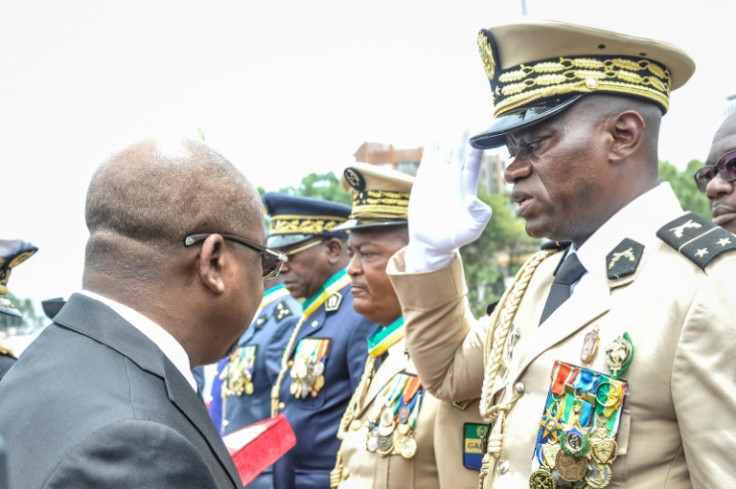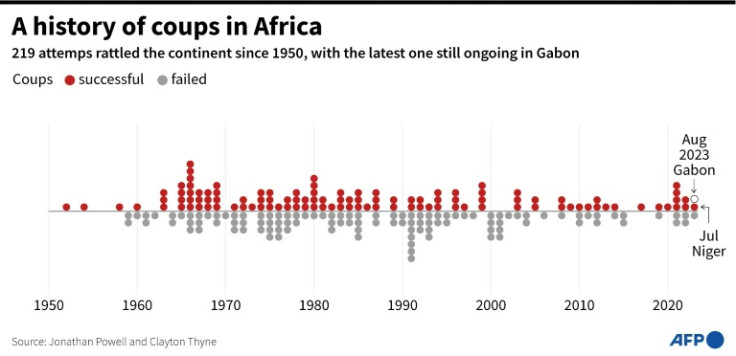Gabon's Strongman Meets Key Groups After Coup

Gabon's new strongman General Brice Oligui Nguema on Friday stepped up contacts with national groups and foreign interests two days after heading a coup that ended 55 years of rule by the Bongo family.
Pursuing an initiative to speak to Gabon's "vital forces" following the takeover, Oligui met members of civil society a day after a speech to 200 businessmen, whom he lectured on corruption.
Broadcast on state television on Friday, he sternly warned business leaders in the oil-rich state against "over-billing" and told them to commit to the "development of the country."
"It is difficult to perceive, at this stage, your commitment or patriotism when it comes to the development expected by our compatriots," Oligui said.
He vowed to make sure the overcharged money "comes back to the state".
"This situation, for me, cannot continue, and I will not tolerate it".
He also invited foreign donors, diplomats and members of international organisations to meet with him. Details of that meeting remained unclear.
Embassies of countries or organisations that have condemned the coup told AFP that they did not sent their seniormost representatives, but rather officials of a lesser rank.
Oligui, the head of the elite Republican Guard, on Wednesday led officers in a coup against President Ali Bongo Ondimba, scion of a family that had ruled for 55 years.
The ouster came just moments after Bongo, 64, was proclaimed victor in presidential elections at the weekend -- a result branded a fraud by the opposition.
The coup leaders said they had dissolved the nation's institutions, cancelled the election results and closed the borders.
Oligui is due on Monday to be sworn in as "transitional president."
But other countries have not acknowledged him as Gabon's legitimate leader and he faces pressure to spell out his plans for restoring civilian rule.
Five other countries in Africa -- Mali, Guinea, Sudan, Burkina Faso and Niger -- have undergone coups in the last three years, with their new rulers resisting demands for a short timetable for returning to barracks.
Bongo had been seeking his third term in office after coming to power in in 2009 after the death of his father Omar.
The coup leaders said Wednesday they had put him under house arrest and placed him "in retirement."
However, he was able to distribute a video on social media in which he said his son and wife Sylvia had been detained, and appealed to "all friends that we have all over the world... to make noise" on his behalf.
National TV on Friday showed rolling images of the deposed president's son Noureddin Bongo Valentin and other arrested officials in front of suitcases filled with cash allegedly seized from their homes.
The military has accused them of treason, embezzlement, corruption and falsifying the president's signature, among other allegations.
In Paris, lawyers for Sylvia Bongo, a Franco-Gabonese, said they had filed a lawsuit over her "arbitrary detention" and that of her son Jalil.
"She is being held in an unknown place in Gabon," attorney Francois Zimeray told AFP, saying her lawyers were demanding they be given access to the French consulate in Libreville.
A stroke in 2018 sidelined Bongo from public life for 10 months and led to a very brief, and still unexplained, attempt on power by soldiers.
The elder Bongo ruled for 41 years, gaining a reputation as a kleptocrat and a pillar of "Francafrique" -- the now-condemned policy whereby France furthered its political and commercial interests in Africa through cronyism.



© Copyright AFP 2024. All rights reserved.





















